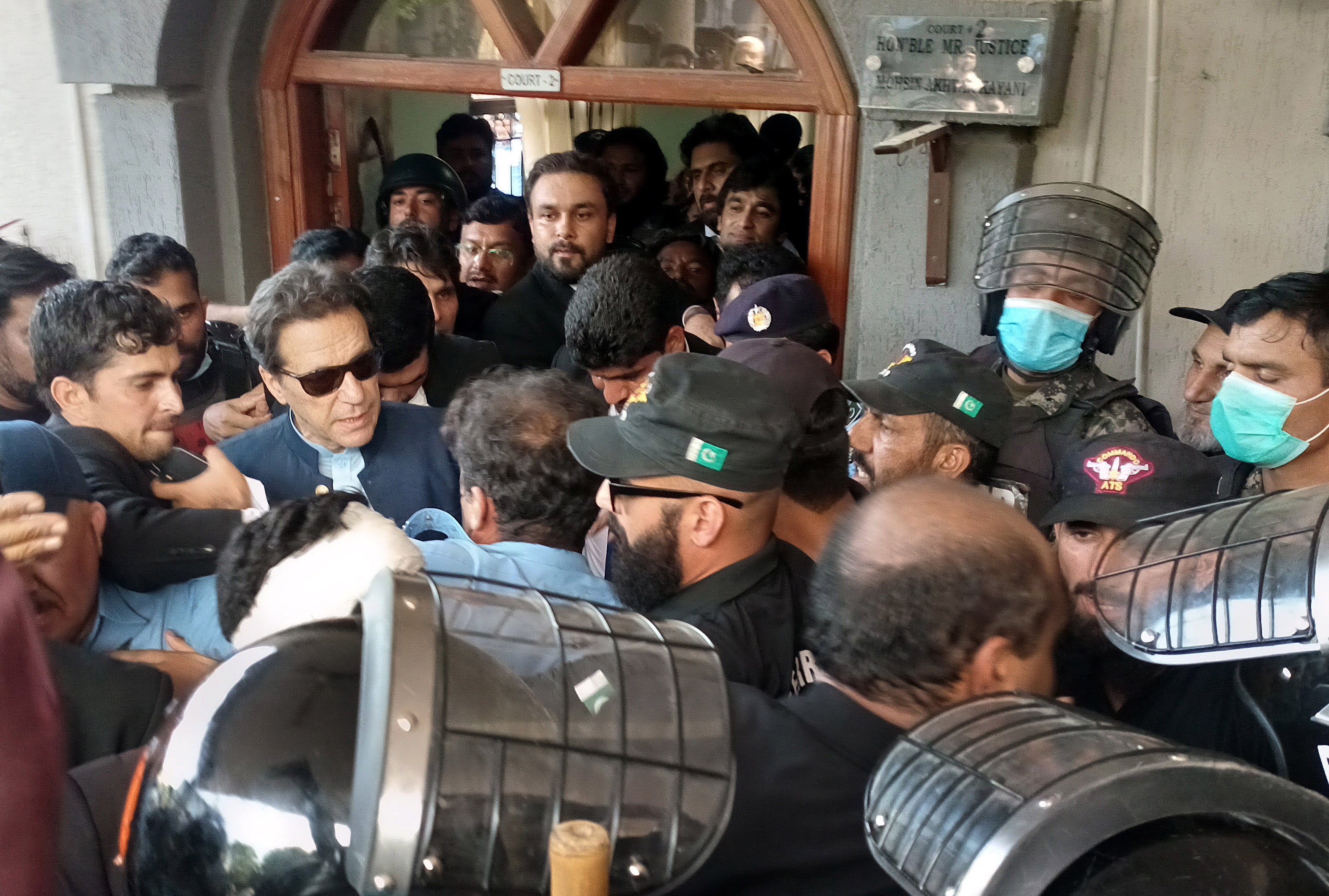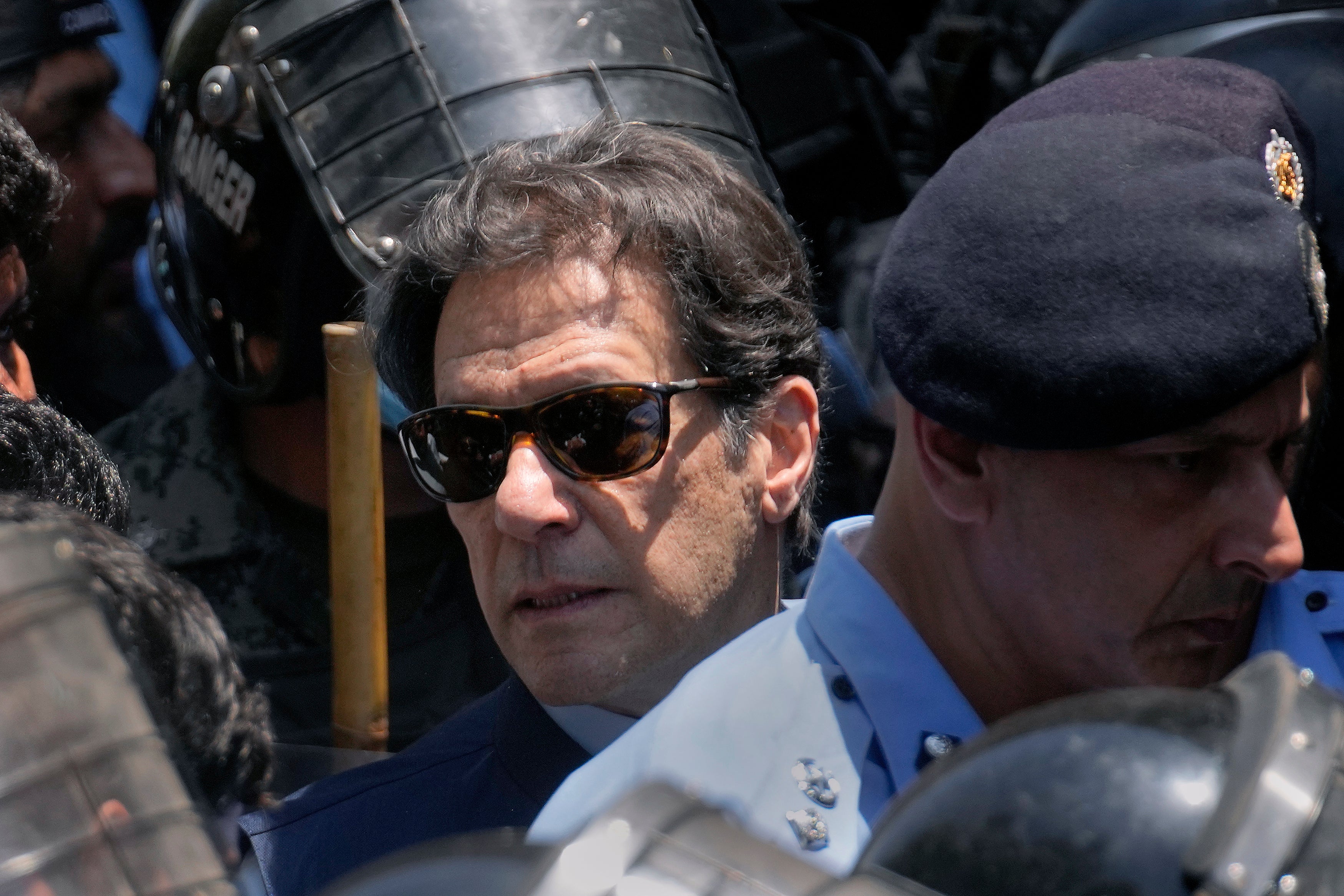‘Why don’t you form your own party’: Imran Khan takes a dig at Pakistan army in first address since release
Court in Islamabad grants Khan broad protection from arrest in multiple legal cases against him
On Saturday, the former Pakistan prime minister Imran Khan targeted the military in his first address since his release from custody and advised them to “form their own political party”.
He was responding to a comment by Ahmed Sharif Chaudhry, the Inter-Services Public Relations (ISPR) director-general major general, calling him a hypocrite: “Listen to me Mr DG ISPR, you were not even born when I was representing my country in the world and earning [a] good name for it. You need to be ashamed of yourself for calling me [a] hypocrite and anti-army.”
Mr Khan was addressing the nation from his Zaman Park residence at 8pm local time and the ISPR is the military’s media wing.
“You have jumped into politics. Why don’t you form your own party. Who has given you the right to make such frivolous allegations. Have some shame for saying that no one else harmed the army to the extent that I did, and that you will crush us,” Mr Khan said.
“They have put the entire leadership of PTI (Pakistan Tehreek-e-Insaf) in jails and arrested over 3,500 workers and instituted more cases against me after the attack on the state buildings by unknown persons. The government parties do not want the elections because they know they will be completely wiped out. That is why they planned this conspiracy and ran away from elections,” Mr Khan said.
“Although you will not listen to me, I advise you to think big. You should see where the country is heading by such actions,” he said, referring to the army.
He also called for protests “at the end of your streets and villages” across the country on Sunday.
“Freedom does not come easily. You have to snatch it. You have to sacrifice for it,” he said.
A court in Islamabad on Friday granted Mr Khan broad protection from arrest in multiple legal cases against him – a ruling that struck a blow to the government in a standoff that has sparked days of rioting by his followers and raised the spectre of widespread unrest in the country.
Mr Khan put out a video statement saying the Islamabad police tried to keep him within the courthouse through different tactics, and authorities allowed him to travel only when he threatened to tell the public he was being held there against his will.
He arrived at his home in the early hours of Saturday morning and was greeted by thousands of supporters, who danced, distributed sweets, set off fireworks and showered his car with rose petals in celebration of his release.
In the evening, shots were heard in the area of the courthouse. Police were investigating who opened fire, the interior minister said. Clashes between his supporters and police have periodically erupted outside the building. The long list of around 100 court cases, on charges ranging from fomenting violence to corruption, still stand against Mr Khan.
After he was abruptly arrested on Tuesday, widescale protests erupted, turning into clashes with police and mob attacks on government buildings and even military installations. The court’s ruling was a victory for Mr Khan, and averted any new arrest for the time being. The Islamabad High Court gave him protection for two weeks on one graft charge and protection until Monday on a host of other charges in a measure called “anticipatory bail”.
The protections in each case can be extended, but it was not immediately clear if that meant a new court hearing on Monday. The charismatic 70-year-old leader, a former cricket star-turned-Islamist politician, has a broad base of support around Pakistan, presenting himself as an outsider victimised by the military and the political dynasties that have long run Pakistan.


Opponents, meanwhile, call him a corrupt demagogue stirring his followers into violence. He was removed as prime minister in April last year in a vote of no-confidence by Parliament.
Interior Minister Rana Sanaullah Khan, who is not related to the former prime minister, told independent GEO television that the government will respect the court order. He said that he could not say whether another attempt would be made to arrest Khan in the coming days but said all those involved in violence will “not be spared” prosecution.
Friday’s broad rulings were unusual, fuelling government complaints that the judiciary was biased in favour of the former prime minister.
It was not clear what prompted Tuesday’s arrest of Mr Khan, who had been free despite the multiple cases against him since he was ousted from office. Whatever the reason, it was startlingly heavy-handed: agents from the National Accountability Bureau burst into the Islamabad High Court where he was attending a session on other charges – the same court where he appeared Friday – and dragged him away, putting him into an armoured vehicle.
The response from his followers was swift. Protesters clashed with police, burned vehicles and looted shops in various parts of the country. Mobs attacked the headquarters of the military in Rawalpindi and ransacked and burned the residence of a top general in Lahore, Pakistan’s second largest city, along with attacks on other military and government buildings.
The violence left at least 10 of his supporters dead. Dozens of protesters and more than 200 police officers were injured. The government responded with a crackdown, arresting nearly 3,000 people. During Friday’s court hearing, Mr Khan supporters set fire to a police vehicle nearby when security forces wouldn’t let them approach the building.
On Thursday, the Supreme Court ruled that Mr Khan‘s arrest was unlawful and asked the Islamabad High Court to review its own previous decision allowing the arrest. In the meantime, Mr Khan was released from custody and spent the night under security forces’ protection in a government rest house.
(with additional reporting from agencies)
Join our commenting forum
Join thought-provoking conversations, follow other Independent readers and see their replies
Comments






Bookmark popover
Removed from bookmarks